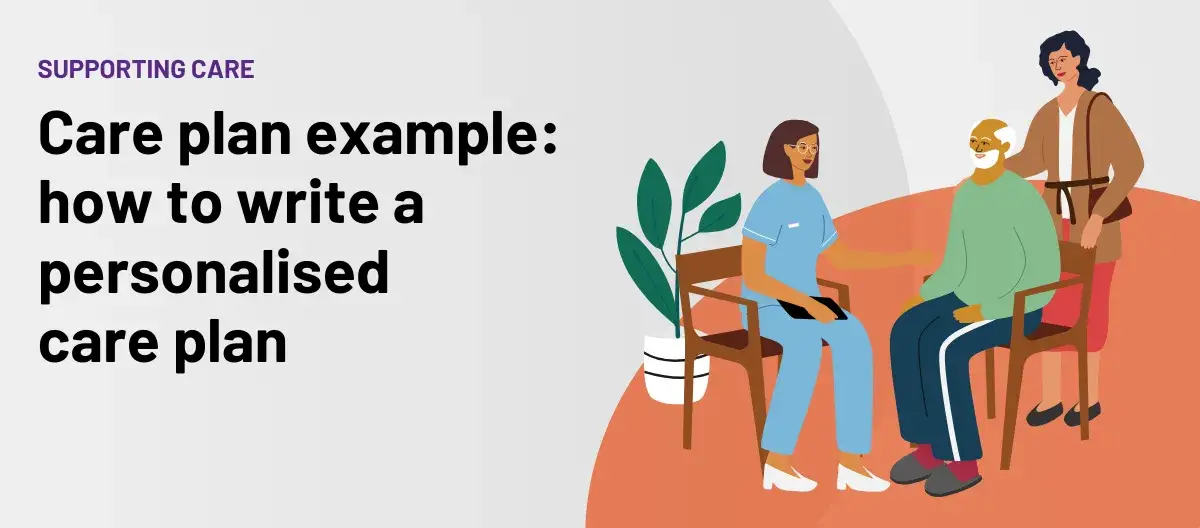
In this guide, we’ll walk you through an example of a personalised care plan that will act as a blueprint for delivering individual-focused care. Whether you’re searching for a practical, person-centred care plan example, real-world applications, or personalised templates, you’ve landed in the right place.
Let’s dive right in.

In the fast-paced world of health and social care, it’s crucial to have a well-structured care plan centred on an individual’s unique needs.
These plans aren’t just paperwork; they’re evolving guides that help multidisciplinary teams (MDTs), care recipients, and their families navigate tailored needs, preferences, and daily challenges.
Think of it as a personalised guidebook that helps care providers understand what’s important to the person and how to provide the best care possible.
Personalised and up-to-date care plans are central to giving person-centred care . Here’s why:
To help put these principles into practice, we’ll be using the PASS care planning app to craft a sample care plan for Miles, a 79-year-old gentleman who receives home-based care.
In each step, we’ll be building Miles’s preferences, interests, and health and social care needs into his personalised care plan.

Tip: If you don’t have a digital care planning tool like PASS, you can use a Word document instead. Having said this, please explore the Digital versus paper care plans section to uncover the main differences between the two methods.
The cornerstone of an individualised care plan is identifying what matters most to the individual. This is where care providers lay the foundation for a plan that respects personal preferences and enhances the overall quality of life.
This could range from documenting dietary preferences to noting down hobbies and interests.
Miles cherishes his independence and enjoys walking, socialising and playing board games. By focusing on these aspects in his care plan, care providers ensure that Miles’ individuality and hobbies aren’t overlooked.
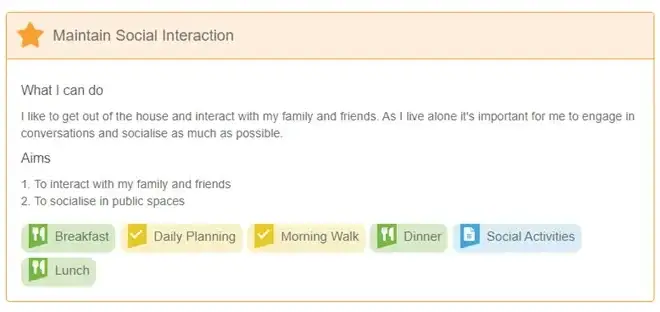
Determining what tasks an individual can handle on their own is essential. This not only helps in allocating resources more effectively but also empowers the individual to maintain a level of independence.
Miles enjoys cooking and managing his finances. His individualised care plan enables care managers to swiftly document these capabilities, enabling the care team to focus on more demanding areas of his care.
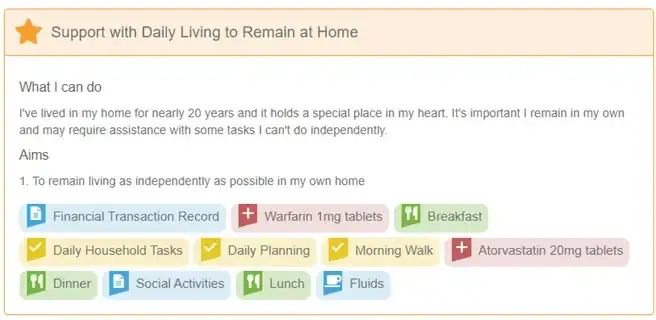
Effectively managing medical conditions and medication is crucial for ensuring the well-being of individuals in care.
A well-structured care plan can help in monitoring symptoms, administering medication, and evaluating treatment effectiveness.
Miles is prescribed two different types of medication, which is noted in his care plan, as well as when to take them. Any support needed with the management of his medication is also noted.
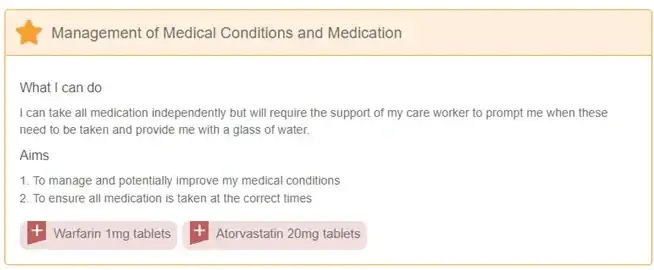
Ensuring proper nutrition and hydration is fundamental in any care setting. A balanced diet and adequate fluid intake can significantly impact an individual’s health, from maintaining energy levels to preventing complications.
Miles can prepare his own food and drinks, but occasionally requires prompts from carers to prepare meals.
The PASS care planning app allows the care team to input dietary requirements and hydration goals, making it easier to track his nutritional intake. The app will also show if a nutritional task has been missed, ensuring that Miles receives the nutrients he needs.
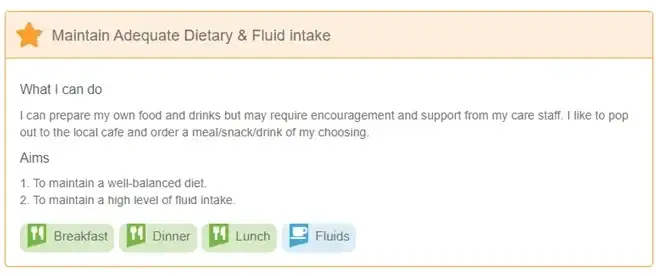
Monitoring and observation are essential aspects of care, particularly for vulnerable individuals at risk. There should be plans in place describing what should be monitored and how observations should be recorded.
Although Miles is capable of drinking independently, he often needs reminders to stay hydrated. Carers use the PASS care planning app to track his fluid intake, enabling managers to track trends and manage changes in circumstances, while ensuring he feels understood, heard and included in his own care.
Determining the timing and location of care is a critical aspect of effective care planning. Whether it’s in a domiciliary setting, a care home, or during reablement, the right environment can make a significant difference in the quality of care provided.
The care team visit Miles every morning, afternoon and evening. The PASS care planning app enables managers to schedule visits according to his preferences, ensuring that he receives the care he needs when and where it’s most convenient for him.
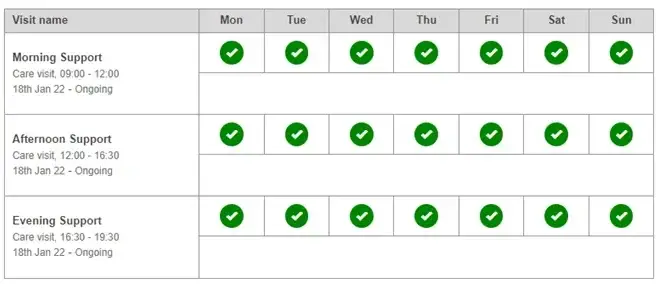
Organising day-to-day activities is essential for ensuring a high quality of life for individuals in care. A well-structured daily plan can help manage time effectively, allocate resources, and provide a sense of routine and stability.
Each morning, Miles requires a gentle reminder to take his prescribed medication and some encouragement to organise his day’s activities. He enjoys starting his day with a cup of coffee, a glass of apple juice, or some orange squash, along with a breakfast of his choosing.
These details are meticulously documented in the morning section of his care plan, a brief excerpt of which is provided below. Miles’ plans for the afternoon and evening are similarly recorded and incorporated into his comprehensive care plan.
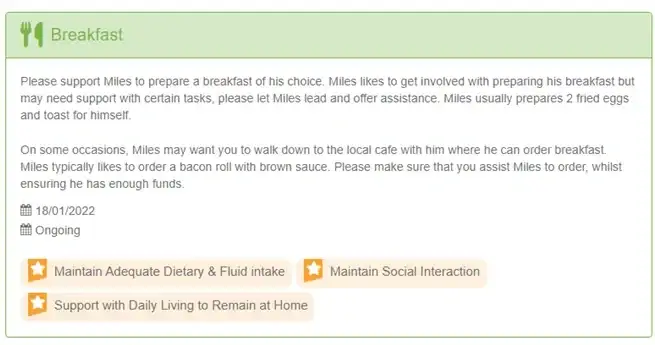
Managing complex care needs is vital in providing holistic care. Understanding and supporting these needs are key to maintaining a person’s dignity and quality of life.
Miles’s continence care is managed with dignity and respect. The PASS app allows carers to note any continence issues, track patterns, and identify possible triggers. This data informs the development of a personalised care plan that respects Miles’ dignity while addressing his needs. The real-time update feature ensures any changes in Miles’ condition are promptly communicated to the care team, allowing for quick adjustments to his care plan and ensuring his continence needs are managed effectively.
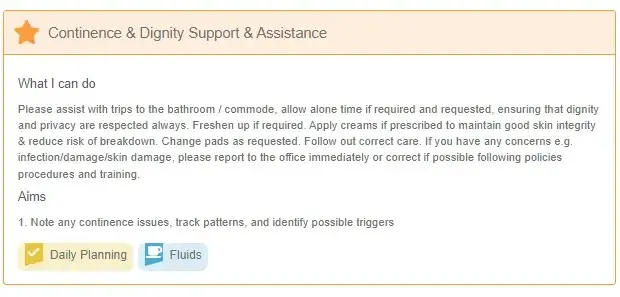
Conducting a thorough risk assessment is a critical component of care planning. Identifying potential risks and implementing strategies to mitigate them is essential for ensuring the safety and wellbeing of care recipients.
Miles’s care plan includes a detailed risk assessment, focusing on fall prevention, self-neglect, and monitoring for signs of dementia. The PASS software is utilised to create and maintain this assessment. It allows carers to document potential hazards and implement preventive measures.
The app’s reporting system also helps carers remain vigilant for signs of self-neglect, such as poor hygiene or missed meals, and for symptoms indicative of dementia. This proactive approach ensures that risks are managed effectively, providing a safe environment for Miles and supporting his overall health and safety.
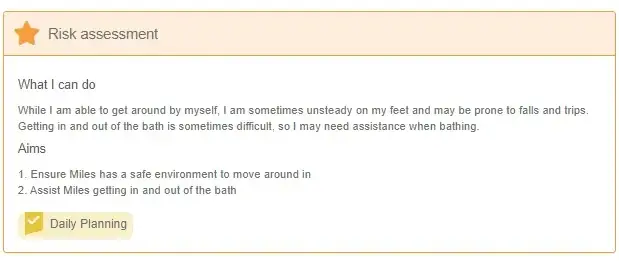
After speaking to Miles, his family, his friends, and his multidisciplinary team, we’ve now crafted a highly personalised care plan, focussing on Miles’ preferences and needs.
We know what tasks Miles can handle on his own, and what he needs help with. We also understand what type of medication he takes and where and when care will be delivered.
This care plan will empower care providers to deliver efficient and effective care, while tools like the PASS care planning app can facilitate easy documentation and coordination among all those involved in Miles’ care.
Tip: It’s important to remember that this is just one example of a care plan. No individual is the same, and each will have their own complex set of healthcare needs and preferences. Here’s a list of other elements you should consider when creating a care plan for your service user:
Now we’ve looked at what’s included in a care plan, let’s talk about creating one.
Creating a care plan might sound complex, but with the right tools – like a digital care planning app – it becomes a straightforward process. Scroll through the timeline to learn about the steps involved: